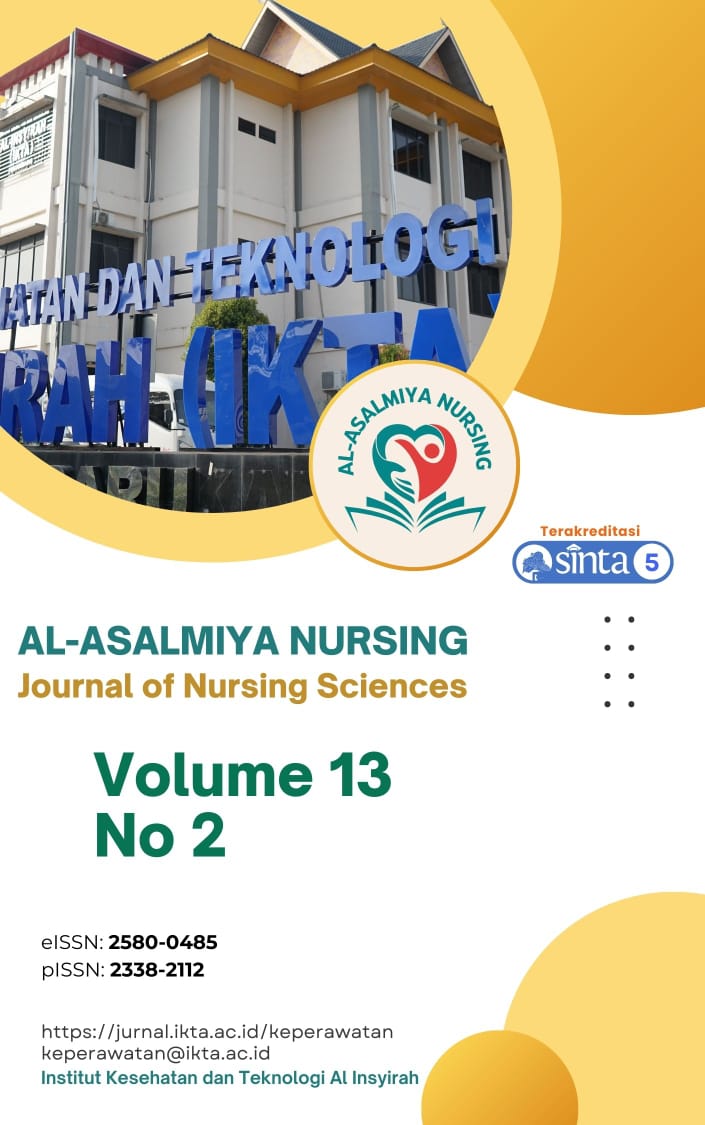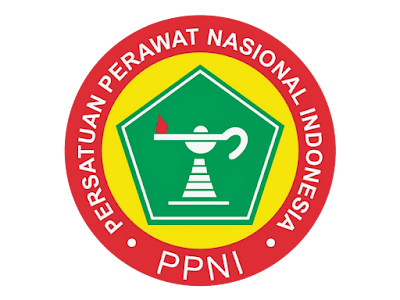EFEKTIVITAS ANTIMIKROBA DISINFEKTAN EUCALYPTUS SP DAN MELALUCA SP TERHADAP STAPHYLOCOCCUS AUREUS
DOI:
https://doi.org/10.35328/keperawatan.v13i2.2813Keywords:
Disinfektan, Eucalyptus sp, Minyak Atsiri, Melaleuca sp, Staphylococcus AureusAbstract
Introduction: Staphylococcus aureus is one of the most frequently involved pathogenic microorganisms in infectious diseases in humans. Disinfectants are biocides commonly used to eliminate microorganisms on surfaces to prevent the spread of infectious diseases. Extracts from the leaves of Eucalyptus sp. and Melaleuca sp. contain 1,8-cineole, an antimicrobial substance that can inhibit the growth of a broad spectrum of bacteria while being safer for human mucosal tissues. It is hoped that 1,8-cineole can replace the active compounds commonly found in disinfectants. Purpose: This study aims to compare the effectiveness of disinfectants made from essential oils of Eucalyptus sp. and Melaleuca sp. in killing S. aureus bacteria. Methods: Essential oils were obtained by distilling the dried leaves of Eucalyptus sp. and Melaleuca sp., then chlorhexidine digluconate (CHG) and 70% isopropyl alcohol (IPA) were added. The disinfectant formulas were then tested on colonies of S. aureus bacteria. Results: The disinfectant spray extracted from the essential oil of Eucalyptus sp. had an inhibition zone of 38.99 mm, whereas the one made from Melaleuca sp. extract had an inhibition zone of 11.88 mm. Conclusion: At the same concentration, the disinfectant spray with essential oil of Eucalyptus sp. is more effective in inhibiting the growth of S. aureus
Downloads
References
Agus Wibowo, M., Ardiningsih, P., Jayuska, A., Kimia, J., Matematika dan Ilmu Pengetahuan Alam, F., Tanjungpura, U., & Ilmu Kelautan, J. (2023). Karakterisasi Minyak Atsiri Daun Kayu Putih (Melaleuca leucadendra) Kota Pontianak dan Aktivitasnya Terhadap Streptococcus mutans Characterization of The essential oil of Eucalyptus Leaves (Melaleuca leucadendra) from Pontianak City and Its Activity Against Streptococcus mutans. In Jurnal ILMU DASAR (Vol. 24, Issue 2).
Ahmad-Mansour, N., Loubet, P., Pouget, C., Dunyach-Remy, C., Sotto, A., Lavigne, J. P., & Molle, V. (2021). Staphylococcus aureus toxins: An update on their pathogenic properties and potential treatments. In Toxins (Vol. 13, Issue 10). MDPI. https://doi.org/10.3390/toxins13100677
Chaves, T. P., Pinheiro, R. E. E., Melo, E. S., Soares, M. J. dos S., Souza, J. S. N., Andrade, T. B. de, Lemos, T. L. G. de, & Coutinho, H. D. M. (2018). Essential oil of Eucalyptus camaldulensis Dehn potentiates β-lactam activity against Staphylococcus aureus and Escherichia coli resistant strains. Industrial Crops and Products, 112, 70–74. https://doi.org/10.1016/j.indcrop.2017.10.048
Cheung, G. Y. C., Bae, J. S., & Otto, M. (2021). Pathogenicity and virulence of Staphylococcus aureus. In Virulence (Vol. 12, Issue 1, pp. 547–569). Bellwether Publishing, Ltd. https://doi.org/10.1080/21505594.2021.1878688
Constantia Lidwina Targanski, Wiwin Retnowati, Mohammad Fathul Qorib, Manik Retno Wahyunitisari, & Wilda Mahdani. (2023). IN VITRO ANTIBACTERIAL ACTIVITY OF EUCALYPTUS (Melaleuca leucadendra) OIL AGAINST METHICILLIN-RESISTANT Staphylococcus aureus (MRSA). Majalah Biomorfologi, 33(2), 59–67. https://doi.org/10.20473/mbiom.v33i2.2023.59-67
Febry Sulistiyani, I., Tri Prasetya Jurusan Kimia, A., & Matematika dan Ilmu Pengetahuan Alam, F. (2022). Antibacterial Activity of Cajuputi Oil (Melaleuca leucadendron) Microcapsules Against Staphylococcus aureus Bacteria Applied to Cotton Fabric Fibers. In Indonesian Journal of Chemical Science (Vol. 11, Issue 1). http://journal.unnes.ac.id/sju/index.php/ijcs
Hamad Vuai, S. A., Sahini, M. G., Sule, K. S., Ripanda, A. S., & Mwanga, H. M. (2022). A comparative in-vitro study on antimicrobial efficacy of on-market alcohol-based hand washing sanitizers towards combating microbes and its application in combating Covid-19 global outbreak. Heliyon, 8(11). https://doi.org/10.1016/j.heliyon.2022.e11689
Ikuta, K. S., Swetschinski, L. R., Robles Aguilar, G., Sharara, F., Mestrovic, T., Gray, A. P., Davis Weaver, N., Wool, E. E., Han, C., Gershberg Hayoon, A., Aali, A., Abate, S. M., Abbasi-Kangevari, M., Abbasi-Kangevari, Z., Abd-Elsalam, S., Abebe, G., Abedi, A., Abhari, A. P., Abidi, H., … Naghavi, M. (2022). Global mortality associated with 33 bacterial pathogens in 2019: a systematic analysis for the Global Burden of Disease Study 2019. The Lancet, 400(10369), 2221–2248. https://doi.org/10.1016/S0140-6736(22)02185-7
Matsumoto, H., Shiotani, A., & Graham, D. Y. (2019). Current and Future Treatment of Helicobacter pylori Infections. In Advances in Experimental Medicine and Biology (Vol. 1149, pp. 211–225). Springer New York LLC. https://doi.org/10.1007/5584_2019_367
Mcdonnell, G., Russell, A. D., Operations, L., & Louis, S. (1999). Antiseptics and Disinfectants: Activity, Action, and Resistance. In Clinical Microbiology Reviews (Vol. 12, Issue 1).
Melani, I. R., Farid Wafi, M., Riandinata, M. R., Aulawiya, P., Halim, R., Muti’ah, R., & Santosaningsih, D. (2022). Potential Inhibition of Melaleuca leucadendron L. Compounds Against the NSP5 SARS CoV-2 Protein. Indonesian Journal of Cancer Chemoprevention. https://www.rcsb.org/search
Mieres-Castro, D., Ahmar, S., Shabbir, R., & Mora-Poblete, F. (2021). Antiviral activities of eucalyptus essential oils: Their effectiveness as therapeutic targets against human viruses. In Pharmaceuticals (Vol. 14, Issue 12). MDPI. https://doi.org/10.3390/ph14121210
Poppolo Deus, F., & Ouanounou, A. (2022). Chlorhexidine in Dentistry: Pharmacology, Uses, and Adverse Effects. In International Dental Journal (Vol. 72, Issue 3, pp. 269–277). Elsevier Inc. https://doi.org/10.1016/j.identj.2022.01.005
Pujiarti, R., Nurjanto, H. H., & Sunarta, S. (2018). Antifungal activity of eucalyptus urophylla oil against aspergillus Niger and fusarium oxysporum. Agrivita, 40(1), 55–62. https://doi.org/10.17503/agrivita.v40i1.990
Sinarsih, N. K., Susanah Rita, W., & Puspawati, N. M. (2021). Aktivitas Antibakteri Fraksi Ekstrak Etanol Daun Trembesi (Samanea saman (Jacq.) Merr) terhadap Staphylococcus aureus. International Journal of Applied Chemistry Research, 1, 2549–3671. https://doi.org/10.23887/ijacr-undiksha
Song, X., Vossebein, L., & Zille, A. (2019). Efficacy of disinfectant-impregnated wipes used for surface disinfection in hospitals: A review. In Antimicrobial Resistance and Infection Control (Vol. 8, Issue 1). BioMed Central Ltd. https://doi.org/10.1186/s13756-019-0595-2
Steinsapir, K. D., & Woodward, J. A. (2017). Chlorhexidine Keratitis: Safety of Chlorhexidine as a Facial Antiseptic. In Dermatologic Surgery (Vol. 43, Issue 1, pp. 1–6). Lippincott Williams and Wilkins. https://doi.org/10.1097/DSS.0000000000000822
Tyski, S., Bocian, E., & Laudy, A. E. (2022). Application of normative documents for determination of biocidal activity of disinfectants and antiseptics dedicated to the medical area: a narrative review. In Journal of Hospital Infection (Vol. 125, pp. 75–91). W.B. Saunders Ltd. https://doi.org/10.1016/j.jhin.2022.03.016
Tyski, S., Bocian, E., Mikucka, A., & Grzybowska, W. (2013). Antibacterial activity of selected commercial products for mouth washing and disinfection, assessed in accordance with PN-EN 1040. Medical Science Monitor, 19(1), 458–466. https://doi.org/10.12659/MSM.883952
Zhou, L. J., Li, F. R., Huang, L. J., Yang, Z. R., Yuan, S., & Bai, L. H. (2016). Antifungal activity of Eucalyptus oil against rice blast fungi and the possible mechanism of gene expression pattern. Molecules, 21(5). https://doi.org/10.3390/molecules21050621
Downloads
Published
Issue
Section
License
Copyright (c) 2024 Al-Asalmiya Nursing: Jurnal Ilmu Keperawatan (Journal of Nursing Sciences)

This work is licensed under a Creative Commons Attribution 4.0 International License.














